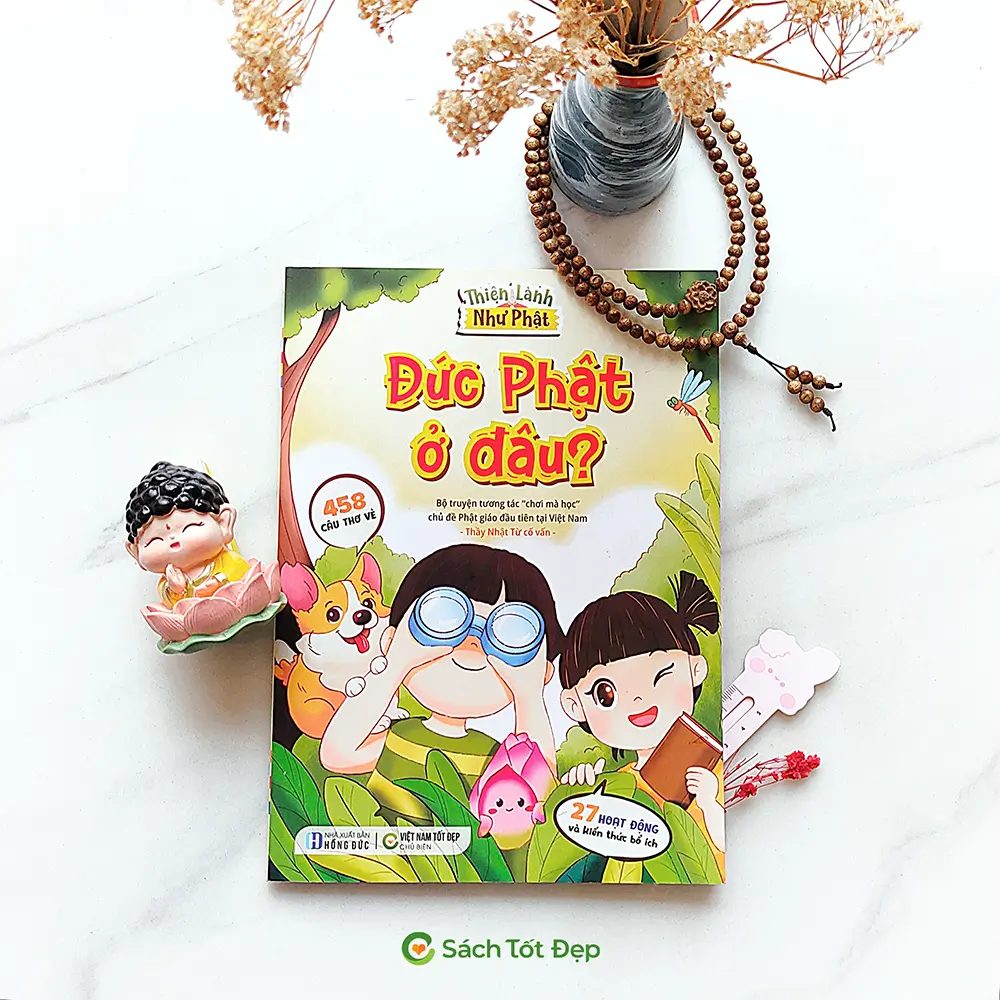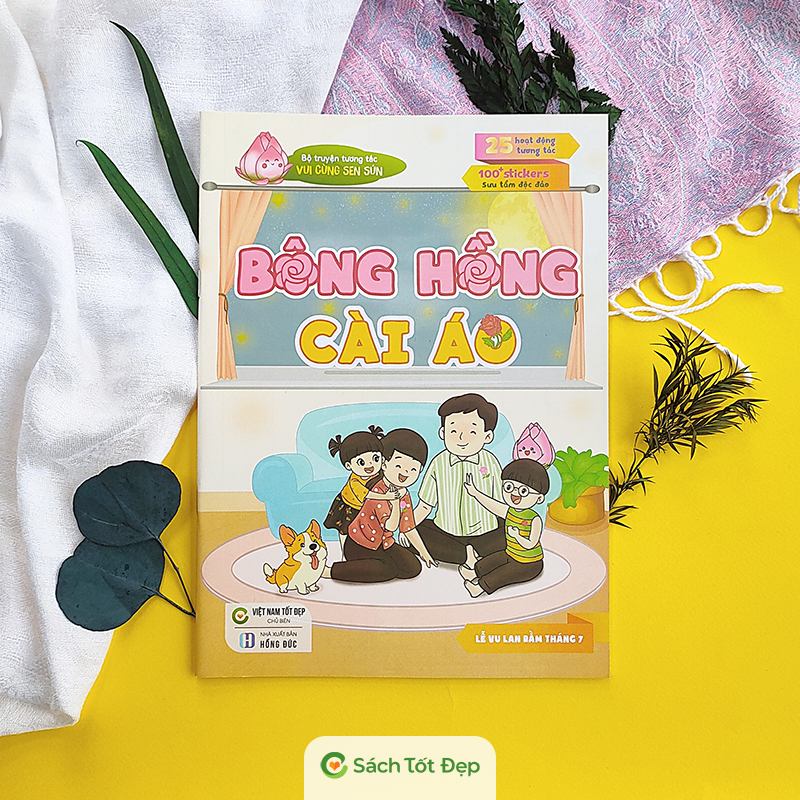The Value of Buddhism for the Young Minds
How to Teach Buddhism to Children?
Buddha’s teachings fundamentally instruct us to avoid causing harm and to help others as much as possible. These are values that all parents, whether Buddhist or not, wish to instill in their children for harmonious living with others. Since children mostly learn by example, the best way for parents to teach these virtues is to live by them themselves. Of course, this isn’t always easy! But if parents practice this well, their children will directly benefit.
Growing up in a Buddhist family can be very beneficial for children. If the family has a Buddhist altar, children can help clean it and offer fruits and flowers. A friend of mine and her three-year-old daughter bow three times before their Buddhist altar every morning. The little girl then offers cakes and fruits to Buddha, and her mother gives her a cake or a candy from the altar (usually an offering from the day before). The child really enjoys this ritual.
Children love music, and the melodious sounds of Buddhist chants, mantras, and hymns can replace regular songs and lullabies. Many parents have found that reciting mantras to their children when they are fussy or sleepy elicits a positive response. In another family I know, their five-year-old son leads grace before meals. These simple but effective methods help parents and children share a spiritual life.
Buddhist families can also meet weekly or monthly for collective study and practice. Instead of just sending children to religious classes taught by others, practicing together offers a chance for busy parents and children to spend quiet time together. Additionally, it allows Buddhist families to meet and support each other. Activities for children could include learning Buddhist songs, mantras, bowing and offering rituals at the altar, and short mindfulness meditation sessions.
Parents and school-age children can engage in role-playing, creating scenarios where characters think only of their own happiness rather than others’, and then repeating the play with one character considering others’ happiness. Such activities teach children problem-solving and demonstrate the outcomes of different actions. Families can also visit Buddhist temples and centers in their community together.
(Source: Cung Song An Vui)
How to Engage Children in Buddhism?
Reading Buddhist books for children and watching Buddhist videos are other activities that parents can share with their children. There are many animated films about the life of the Buddha and numerous Buddhist books for kids. Intimate discussions with children are both educational and fun, and parents may be surprised at how open their children are to concepts such as reincarnation, karma, and compassion towards animals.
Many parents complain, “”My child can’t sit still!”” I suspect these children rarely see their parents sitting quietly! When children observe adults sitting in silence, they may follow suit. Sometimes, children can share these quiet moments with their parents. For example, a child can sit on a parent’s lap while they read scriptures. Other times, when meditating, parents might prefer not to be disturbed, and children should learn to respect their parents’ desire for quiet.
For teenagers, group discussions can be more beneficial. Adults can facilitate discussions about friendship or other topics relevant to adolescence. Buddhism’s uniqueness lies in its applicability to all life aspects. The more children understand the importance of moral values and love in their lives, the more they will respect these virtues.
I once led a group discussion for twenty teenagers about relationships. Each shared their views, and while they spoke about their lives and feelings, many Buddhist principles emerged, like the importance of living morally. As a facilitator, I didn’t teach or preach; I just listened and respected their views. Afterwards, some told me, “”This is the first time we’ve talked about these things with a nun!”” Not only were they open about a sensitive topic in front of an adult, but they also understood that religious figures are aware of and sympathetic to adolescent concerns. Moreover, they recognized what’s important in their lives.
How to Guide Children in Meditation?
Children are often curious when they see their parents meditating daily. This can be an opportunity to teach them simple breath awareness meditation. Children usually enjoy sitting quietly with their parents for about five or ten minutes. When their attention wanes, they can gently leave the room while their parents continue meditating. If parents find their child’s departure distracting, they can meditate privately and have a separate meditation time with their children.
Children can also practice meditation through visualization. Most enjoy pretend play and can easily imagine things. Parents can teach them to visualize the Buddha made of light. Then, as the light spreads from the Buddha to them and all around, they can recite mantras. If a child has a sick friend, relative, or pet, or a friend with a problem, they can specifically think of them and imagine the Buddha’s light reaching out to them. In this way, children develop compassion and care for helping those they love.
What if children are not interested in Buddhism? Should they be allowed to go to church with their friends?
Religion should not be imposed on anyone. If children are not interested in Buddhism, let them be. They can still learn kindness by observing their parents’ behavior and actions.
(Source: Cung Song An Vui)
Friends often invite each other to church. Since we live in a multicultural, multi-religious society, it’s beneficial for our children to learn about other traditions by attending services at churches or temples with their friends. When this happens, we should prepare our children by explaining that people have different beliefs, and therefore, respecting and accepting each other’s religions is important. Our children can also invite their friends to Buddhist centers or religious activities, fostering mutual understanding and respect.
If you think your child is being persuaded or pressured to convert to the religion of their friends, then you should intervene early. Explain to them what Buddhists believe and why. Describe how Buddhist beliefs and values can help your children address issues in their lives. Teach them how to respond to questions about Buddhism from their friends, as well as how to ask questions about other religions. In summary, teach your child how to judge for themselves.
How to Maintain Good Relationships with Children, Especially as They Enter Adolescence?
Having an open relationship with children as they grow into adolescence is crucial. This depends on how parents have treated them when they were younger. This treatment, in turn, depends on the time parents spend with their children and their positive attitude towards them.
When parents are always busy, they often see their children as a burden – another task to handle before they are exhausted after a tiring day at work. Children sense this and often feel neglected or that their parents don’t have time for them, even if that’s not the truth.
It’s essential to determine what is a priority in establishing a good relationship with your children. This might mean accepting a job with lower pay that doesn’t require many hours or declining a promotion that offers more money but comes with more stress and less time at home.
For children, love and attention are more important than material possessions. They need their parents’ affection and care more than having their own computer, iPod, or TV. Choosing a job that pays more but at the cost of good family relationships means we might end up spending more on therapy and counseling for both parents and children later!
Talk to those teenage kids about their interests, even if you don’t care about them. Don’t just talk to them about studying hard or keeping the house clean. Talk about sports or modern fashion. Keep the lines of communication open.
Do Children Need Discipline? How Do We Discipline Them Without Anger?
Children often present us with the best – and most challenging – opportunities to practice patience! For this reason, parents are often advised to know ways to overcome anger as taught by the Buddha.
Patience doesn’t mean letting children do whatever they want. In fact, doing so is harmful to children, as it leads to the development of bad habits, making it difficult for them to get along with others. One of the most valuable skills parents can teach their children is how to behave when they don’t get what they want. When their demands are not met, they need to learn to accept it. They need guidance to understand limits and their place. They must know the consequences of their actions and learn to distinguish between good and bad. Parents should avoid being pressured by their children into buying unnecessary things or participating in activities they are not ready for. However, simply saying “no” misses the opportunity to teach children to think in such situations. When children are old enough, parents should explain the reasons.
Contentment is a Core Principle in Buddhism. How Can We Teach This to Our Children?
Contentment and satisfaction bring more joy and happiness in life. I think one reason why children are never satisfied or accepting is that they have too many choices in pleasures. From a young age, they are asked, “Do you want apple or orange juice?”, “Which TV channel would you like to watch?”, “Which bike do you prefer?”, “Do you want the red or blue toy?”…
Children – not to mention adults – become overwhelmed with too many choices. Instead of being content with whatever they have, they are always forced to think, “What will make me happier? What else do I need for happiness?”. This only increases their greed and ignorance.
To change this doesn’t mean parents need to become authoritarian. Instead, they should avoid emphasizing these issues in the family. Of course, this depends on whether the parents themselves change their attitudes towards pleasures and material possessions. If parents cultivate contentment, their children will find it easier to follow suit.
Teenagers Often Come Home Late. As a Parent, How Do I Not Blame Myself for Their Irresponsible Actions?
As a parent, you nurtured your children from when they knew nothing and depended entirely on you. At that time, you were responsible for every aspect of the child’s life. But as your child grows and becomes more independent, they gradually take on their own responsibilities, and you are no longer responsible for every aspect of their life. Learning to let go is also a challenge in parenting.
As parents, we all want our children to be happy and not suffer. Thus, we teach them skills to cope with various situations. However, we can’t follow them throughout their lives to protect them from pain. That’s unrealistic and quite painful too! Would you want to watch over your child 24 hours a day? Our parents wanted us to be happy, but they also had to let us live our lives. They taught us skills, so even though we made mistakes, we survived. We learned to cope with those mistakes, learn from them, and move forward. Our children must do the same.
It’s heartbreaking to see loved ones – children, partners, parents, friends – make mistakes. Sometimes we can’t do anything to prevent it. We just need to be there and help them learn from their own mistakes.
Sometimes parents go to extremes when dealing with rebellious teenagers. They become like a military drill instructor, interrogating their children with a barrage of questions about where they went, who they were with, and what time they’ll be home. Teenagers see this as an infringement on their independence and may become even more defiant.
Another extreme is to let children come and go as they please, treating the home like a hotel, leaving parents to wash clothes, clean the house, and prepare meals for them. To avoid this, we need to teach children from a young age that family members must support each other. Assign them household chores. As they get older, let them do their laundry, clean the house, and cook. These responsibilities should not be assigned only to daughters. Sons also need to learn to take care of themselves.
(Source: Giac Ngộ)
Sản phẩm bạn có thể quan tâm

The Colors of Buddha: A Spiritual Journey Around the World
Coloring book
135.000đ

Buddha’s Little Explorers: Where is Buddha?
Interactive book
59.000đ

Let’s play with Sen Sun: Buddha’s birthday
Coloring book
28.000đ

Let’s play with Sen Sun: Ullambana Festival
Coloring book
28.000đ





